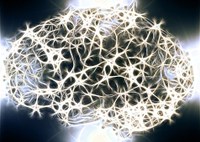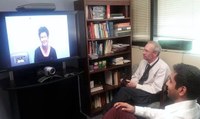Partnerships and Connections
The UofL Depression Center is very involved in new studies and collaborations towards understanding depression and helping those suffering from the effects of depression. Learn more by visiting this blog and connecting with us on Twitter.
Computer-Assisted Therapy
A joint venture with the UofL Depression Center, the University of Pennsylvania.
.
- March 2, 2018
"Effective depression treatment through technology"
Computer-assisted cognitive behavioral therapy effectively treats depression, showing potential to improve access to the treatment and reduce its cost, according to researchers at the University of Louisville and University of Pennsylvania.
Patients experienced a positive and robust response to online cognitive behavioral therapy (CBT), equaling a traditional in-person CBT treatment course with three times more therapist contact, according to the study, which published in the March issue of the American Journal of Psychiatry.
While one of the most effective non-pharmacological treatments for depression, traditional in-person CBT poses barriers to those who need treatment.
“Traditional CBT takes a fair amount of time, money and resources, and there aren’t enough cognitive behavioral therapists,” said Jesse Wright, MD, PhD, director of the UofL Depression Center, Gottfried and Gisela Kolb Endowed Chair in Outpatient Psychiatry in the UofL School of Medicine, and an author of the study. “The technology delivers treatment more efficiently and reduces cost by allowing many more people to be treated by the same therapist.”
For the study, more than 150 medication-free patients with major depressive disorder were randomly assigned to 16 weeks of either traditional CBT, which entails up to 20 sessions of 50 minutes each, or computer-assisted CBT using the Good Days Ahead program and 12 abbreviated therapy sessions.
The program, which Wright helped develop, consists of nine Internet-based modules that use video, psychoeducation, mood graphs to measure progress and interactive skill-building exercises that help users apply CBT methods in daily life. A dashboard allows clinicians to assess progress and coordinate aspects of treatment.
Both treatment groups experienced significant improvements and similar rates of symptom reduction across the 16 weeks of treatment. Patients with chronic and severe depression benefitted from both treatment courses.
The research was funded by grants totaling more than $2.5 million from the National Institute of Mental Health, the lead federal agency for research on mental disorders and part of the National Institutes of Health.
Suicide Prevention
Bold Goals Against Suicide
Learn More
Zero Suicide Project
Learn More
Teachable Moment Brief Intervention
Learn More

Stephen O'Connor
Lead: Teachable Moment Brief Intervention
- April 25, 2018
"Zero Suicide Project Implemented"
- UOFL Depression Center Begins to Implement Suicide Risk Reduction Strategies
The University of Louisville Depression Center has begun to implement quality improvement efforts focused on suicide prevention at the University of Louisville Hospital and Norton Hospital inpatient psychiatry units. The primary aims of these efforts are to systematize the use of screening, assessment, and treatment strategies to address suicide risk in the patients treated in an acute care setting, and to enhance the continuity of care for with healthcare providers in the community. This work is especially important because the risk for suicide has been shown to be 100 times greater than the general population in the first 3 months for all patients who are discharged following hospitalization, and even higher for those who are hospitalized for concerns related to suicidal thoughts and behaviors. In an effort to ensure that the changes to standard of care are maintained over time, a rigorous approach to training and surveillance of suicide risk reduction strategies is being developed. Implementation of our inpatient psychiatry programming is in line with the efforts of other healthcare organizations in Louisville to implement what is known as Zero Suicide, a policy approach that emphasizes comprehensive reforms to prioritize suicide prevention.
In addition to our work in the inpatient psychiatry setting, we are also developing ways to support suicide attempt survivors and family members, and signifi-cant others following hospital discharge. Drs. Stephen O’Connor and Laura Frey are collaborating on a project to combine aspects of the Collaborative Assessment and Management of Suicidality to help patients and family members and significant others move forward together after a suicide attempt. Thirty patients and family members and significant others will be recruited over the next year for the research study, which will involve 8-12 weeks of therapy and follow-up assessments of clinical symptoms at 1- and 3-months post-hospitalization.
New Drug Development
Ketamin: New Hope for Treatment Resistant Depression
Learn More
Hassan Khidr, MD, Psychiatry resident, and Rif El-Mallakh, MD , Professor, UofL Department of Psychiatry & Behavioral Sciences
- May 23, 2017
"Ketamine: New Hope for Treatment Resistant Depression"
Ketamine is a drug that was used in Vietnam War as an anesthetic. More recently, researchers have discovered that ketamine blocks a brain receptor called NMDA, part of the glutamate neurotransmitter system. This action is believed to be the origin of its antidepressant effect.
Although studies have found that ketamine has a dramatic and very rapid effect on reducing depressive symptoms, there are several problems with this drug, including the need to give it intravenously and a risk for causing hallucinations and other disturbances of perception. There has been a great increase in research on this drug because it may have unique potential for breakthroughs in treatment of depression.
Unlike other drugs for depression, ketamine works very quickly. But its positive effects usually disappear within 7-10 days. Thus, there are efforts underway to discover the exact mechanism of action of the drug and to develop similar medicines that can be taken orally, last longer, and don’t have the potential side effects of ketamine.
The most common side effects of ketamine are drowsiness, dizziness, poor coordination, blurred vision, and feeling strange or unreal. These side effects may happen in the first 4 hours after infusion but usually disappear afterwards. Other side effects include elevated heart rate and/or blood pressure. So, close supervision during ketamine administration is essential. Also, there are concerns about this drug’s abuse potential. It is used by some people as a street drug (sometimes called “Special K”) to alter sensation and “get high.” Doses used for treatment of depression are substantially lower than the amounts used by drug abusers.The UofL Department of Psychiatry is currently offering this novel treatment for patients who have been battling depression for many years and have not responded to many other treatments. It is given in an inpatient setting under the supervision of a licensed anesthesiologist.
Researchers are working on ways to reduce the side effects and abuse potential of ketamine or ketamine-like medications and lengthen the time of response. A recent investigation published in Nature identified a specific metabolite of ketamine that is responsible for its robust antidepressant effect without the side effects of the parent com-pound. However, this isolated metabolite is not yet available for use in humans.
MORe Program
Mood Outcomes Registry (MORe program) has goal of instituting measurement-based care for all patients with depression and bipolar disorder.
UofL in association withNNDC

- September 21, 2016
Measurement-Enhanced Care Works!
Evidence continues to mount that measurement-enhanced care improves outcome of treatment of depression. A study from Beijing, China found that measurement-enhanced care more than doubled the rate of remission. And a recent review by Dr. John Fortney and associates in the journal Psychiatric Services concluded that measurement-enhanced care leads to robust improvements beyond those achieved with routine care for depression.
What is measurement-enhanced care? The key ele-ments of measurement-enhanced care are: 1) use of standard self-rating scales at each clinic visit; 2) results of the rating scales are provided to clinicians and patients at each session; 3) results are used to make decisions on treatment. Although the three steps in measurement-enhanced care are straight-forward, they are not taken in most clinical settings. Many reasons for not using meas-urement-enhanced care have been given: “It would take too much time….We don’t have the system to get the rat-ings done….It wouldn’t make a difference, so why go to the effort.”
Now that research has debunked the myth that measure-ment-enhanced care isn’t worth the effort, the UofL Depression Center taking action to adopt this form of care as standard practice. Supported by a gift from an anonymous donor, the UofL Depression Center is part-nering with the National Network of De-pression Centers (NNDC) to establish a digital system for patients to complete four standard rating scales (measuring depression, anxiety, manic symptoms, and suicidal thinking) on IPads prior to each clinic visit. The results are immediately available to clinicians and patients at the start of the treat-ment session.
Experiences with measurement-enhanced care at the UofL Depression Center have been highly favorable. Typically cli-nicians and patients view the symptom ratings at the begin-ning of each session. If good progress has been made, the treatment plan is probably on target. But if progress is stalled or other concerns are revealed, problems are addressed so the patient can get on a positive track to recovery.
The NNDC sponsored measurement-enhanced care initiative has over 2,500 patients enrolled to date. Over the next two years, the goal is to have at least 20,000 patients in the USA benefitting from this measurement-enhanced care system. As an early adopter of measurement-enhanced care, the UofL Depression Centers is helping lead the way in improving treat-ment for mood disorders.
Telepsychiatry Programs
Using technological advances, psychiatrists at the UofL have clinical sessions by video with patients in rural are-as and other parts of the state where access to psychiatric treatment can be difficult to obtain.
Robert Caudill, M.D., Associate Professor, UofL Department of Psychiatry and Behavioral Sciences, Director of Residency Training and Telemedicine and Information Technology Programs

- April 25, 2018
Telepsychiatry Bridges Treatment Gaps
The University of Louisville Department of Psychiatry and Behavioral Sciences is pioneering delivery of mental health services through secure tele-medicine links to community centers throughout the state of Kentucky. Using technological advances, psychiatrists at the UofL have clinical sessions by video with patients in rural are-as and other parts of the state where access to psychiatric treatment can be difficult to obtain.
The state of Kentucky has promoted the development of telepsychiatry programs because it was among the first to establish parity between tele-health services and in-person care in community mental health centers. Although this forward thinking policy has enabled university-based psychiatrists to provide high standard care to patients who live in outlying areas, patients must come to a community mental health center or other medical facility to use the telepsychiatry services. At the present time, insurers are not paying for telepsychiatric treatment delivered directly to patients in their homes or other non-medical sites. However, there is growing evidence from research studies showing effectiveness of telepsychia-try. And it is hoped that the convenience and enhanced access of this method will lead to appropriate insurance coverage and more wide-spread use. Dr. Robert Caudill, Associate Professor of Psychiatry, is the chair of the Telemental Health Special Interest Group of the American Telemedicine Association and is a founding member of the American Psychiatric Association’s committee on telepsychiatry. In his role as Director of the UofL Psychiatry Residency Training Program, he has introduced innovative pro-grams that provide extensive opportunities for trainees to deliver telepsychiatry services under the supervision of experienced faculty. As the delivery of mental health services shifts away from full reliance on traditional office visits, graduates of the UofL psychiatry residency will be prepared to integrate technology into their clinical practices.

 Read More
Read More